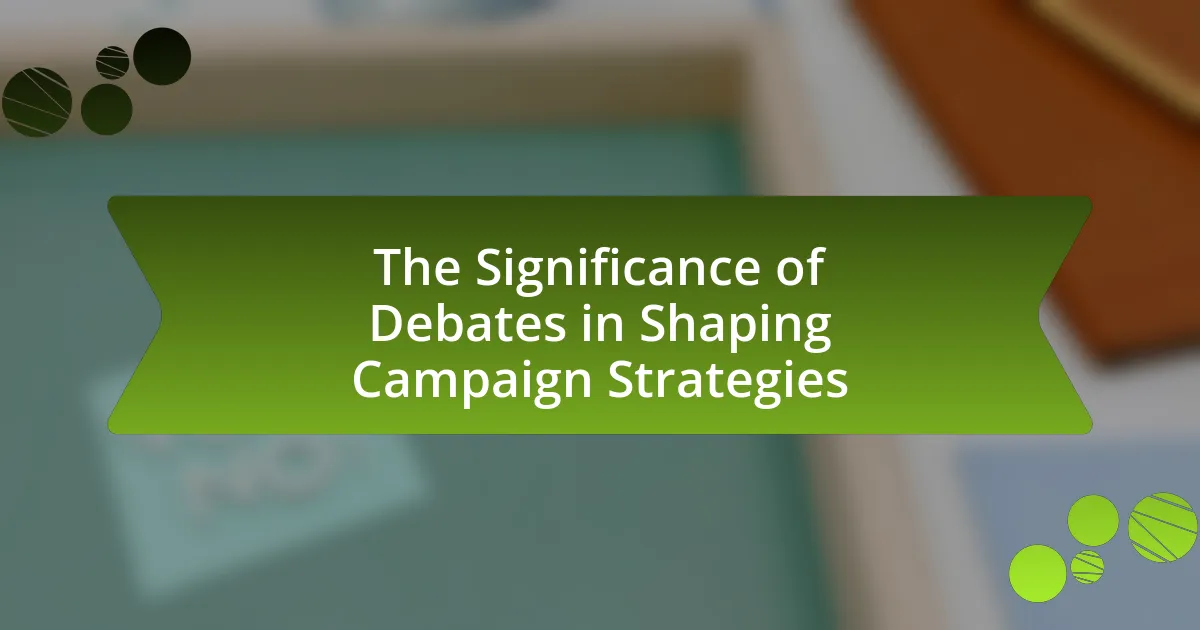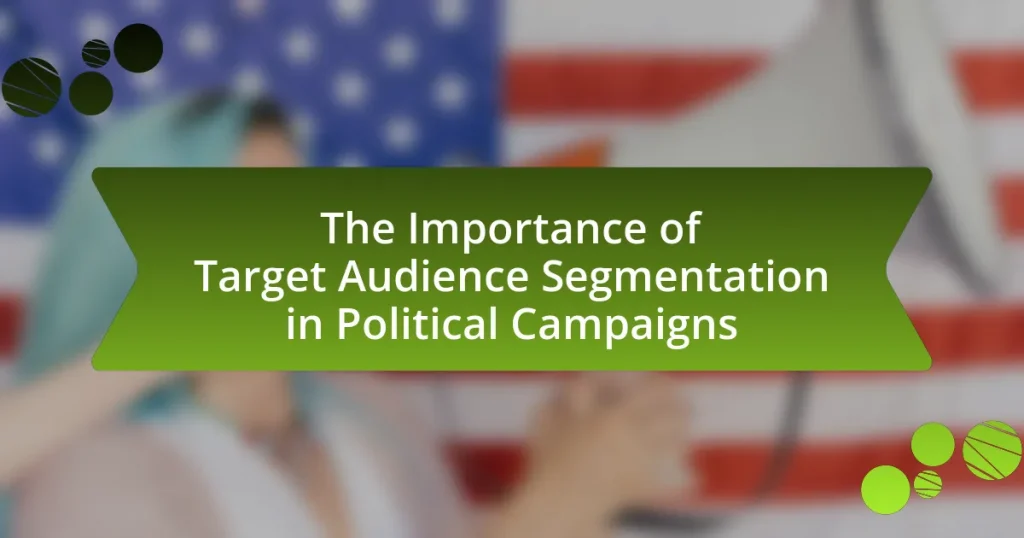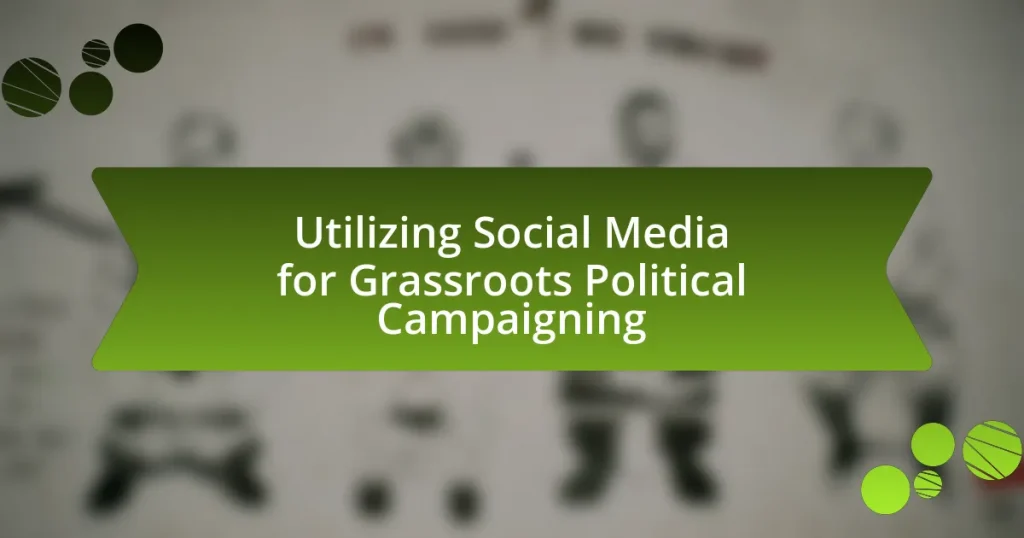Debates play a crucial role in shaping campaign strategies by providing candidates with a platform to communicate policies, engage with opponents, and connect with voters. They influence public perception, sway undecided voters, and allow campaigns to refine messaging based on audience reactions and media coverage. Historical examples, such as the Kennedy-Nixon and Reagan-Mondale debates, illustrate how effective performances can alter electoral outcomes. Additionally, debates help candidates differentiate themselves from opponents and adapt their strategies based on feedback, while also facing challenges related to time constraints and media framing. Overall, debates are integral to the political campaign process, impacting voter attitudes and resource allocation.
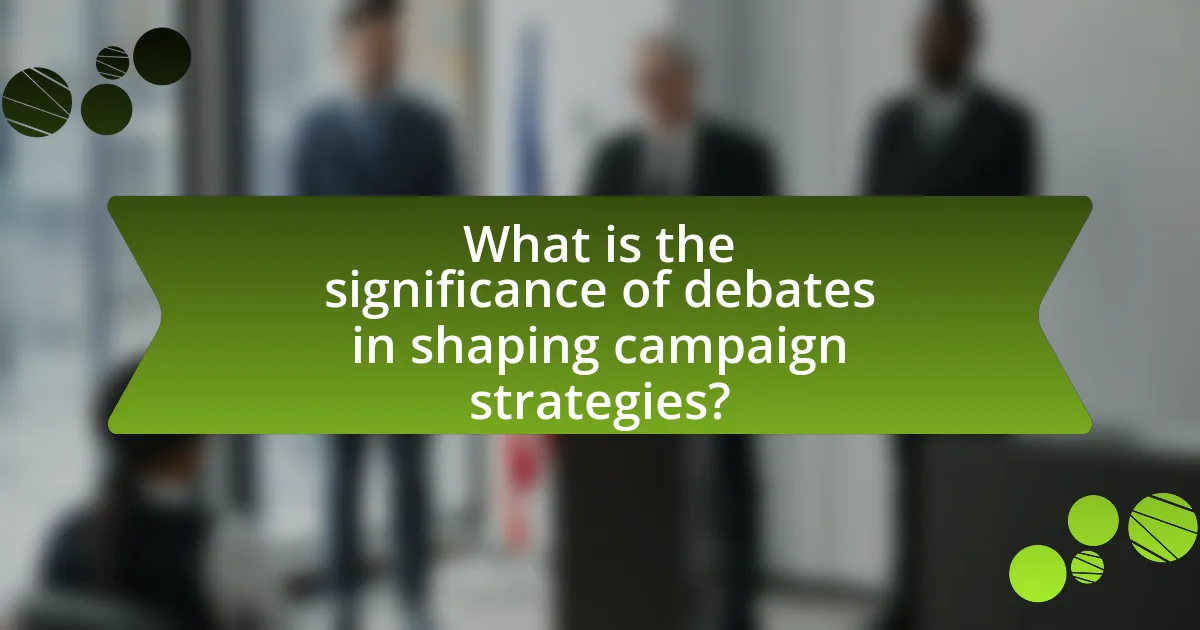
What is the significance of debates in shaping campaign strategies?
Debates are significant in shaping campaign strategies as they provide candidates with a platform to communicate their policies, engage with opponents, and connect with voters. This interaction allows candidates to showcase their strengths and address weaknesses in real-time, influencing public perception and voter decision-making. Historical evidence shows that debates can sway undecided voters; for instance, the 1960 Kennedy-Nixon debate is often cited as pivotal in Kennedy’s eventual victory, highlighting how effective performance can alter campaign trajectories. Additionally, debates help campaigns refine their messaging based on audience reactions and media coverage, further shaping their strategic approach as the election progresses.
How do debates influence public perception during campaigns?
Debates significantly influence public perception during campaigns by providing a platform for candidates to present their policies and engage directly with opponents. This direct interaction allows voters to assess candidates’ communication skills, knowledge, and temperament, which can sway opinions. For instance, research from the Pew Research Center indicates that 67% of viewers felt more informed about candidates’ positions after watching a debate. Additionally, debates can create memorable moments that shape narratives, such as gaffes or strong rebuttals, which often dominate media coverage and public discourse. These factors collectively impact voter attitudes and can shift polling numbers in favor of candidates who perform well.
What role does media coverage play in shaping debate outcomes?
Media coverage significantly influences debate outcomes by framing the narrative and shaping public perception. When media outlets highlight specific issues, candidates, or moments from debates, they can sway voter opinions and priorities. For instance, a study by the Pew Research Center found that media portrayal of candidates during debates can lead to shifts in polling numbers, demonstrating the direct impact of coverage on voter sentiment. Furthermore, the way media emphasizes certain candidates’ performances can create a perception of viability or electability, affecting subsequent campaign strategies.
How do candidates’ performances in debates affect voter opinions?
Candidates’ performances in debates significantly influence voter opinions by shaping perceptions of their competence and relatability. Research indicates that strong debate performances can lead to increased voter support, as evidenced by a study from the University of California, which found that candidates who effectively communicate their policies and connect with the audience during debates often see a measurable boost in poll numbers. For instance, after the 2012 presidential debates, Barack Obama experienced a notable increase in approval ratings, demonstrating how impactful debate performances can be on voter sentiment.
Why are debates considered a critical component of political campaigns?
Debates are considered a critical component of political campaigns because they provide candidates with a platform to articulate their policies, engage with opponents, and connect with voters. This direct interaction allows candidates to showcase their knowledge and leadership skills, which can significantly influence public perception and voter decision-making. Historical data shows that candidates who perform well in debates often experience a boost in polling numbers; for instance, the 1984 presidential debate between Ronald Reagan and Walter Mondale is frequently cited, as Reagan’s strong performance led to a significant increase in his approval ratings. Thus, debates serve as a pivotal moment in campaigns, shaping strategies and voter opinions effectively.
What historical examples illustrate the impact of debates on election results?
The 1960 presidential debates between John F. Kennedy and Richard Nixon significantly impacted election results, with Kennedy gaining a notable advantage in public perception. Polls conducted after the debates indicated that viewers who watched the televised debates favored Kennedy over Nixon, contributing to Kennedy’s narrow victory in the election. Similarly, the 1984 debate between Ronald Reagan and Walter Mondale showcased Reagan’s effective communication style, leading to a substantial increase in his approval ratings and ultimately resulting in a landslide victory. These examples illustrate how debates can shape voter opinions and influence electoral outcomes.
How do debates help candidates differentiate themselves from opponents?
Debates help candidates differentiate themselves from opponents by providing a platform to showcase their unique policies, communication styles, and personal charisma. During debates, candidates can directly address key issues, articulate their positions, and respond to opponents’ arguments in real-time, allowing voters to see contrasts in their approaches. For instance, in the 2016 U.S. presidential debates, Donald Trump and Hillary Clinton highlighted stark differences in their economic policies and foreign relations strategies, which helped voters identify their distinct visions for the country. This direct comparison during debates enhances candidates’ visibility and can influence public perception and voter decision-making.
What are the key elements of effective debate strategies?
The key elements of effective debate strategies include clear communication, strong evidence, active listening, and adaptability. Clear communication ensures that arguments are articulated in a concise and persuasive manner, which is essential for engaging the audience and judges. Strong evidence, such as statistics and credible sources, supports claims and enhances the debater’s credibility. Active listening allows debaters to understand opponents’ arguments and respond effectively, demonstrating critical thinking and engagement. Adaptability enables debaters to adjust their strategies based on the flow of the debate and the reactions of the audience, which is crucial for maintaining relevance and impact throughout the discussion. These elements collectively contribute to a debater’s ability to persuade and influence opinions during a debate.
How do candidates prepare for debates to maximize their impact?
Candidates prepare for debates to maximize their impact by conducting thorough research, practicing responses, and developing clear messaging. Research involves understanding the debate format, the opponent’s positions, and key issues relevant to the audience. Practicing responses allows candidates to articulate their points confidently and handle challenging questions effectively. Developing clear messaging ensures that candidates communicate their core values and policies succinctly, making it easier for voters to understand their positions. For example, successful candidates often engage in mock debates with advisors to simulate the actual debate environment, which has been shown to enhance performance and reduce anxiety during the real event.
What tactics do candidates use to engage and persuade audiences during debates?
Candidates use various tactics to engage and persuade audiences during debates, including emotional appeals, effective body language, and strategic use of facts. Emotional appeals, such as personal stories or relatable experiences, create a connection with the audience, making candidates more memorable and relatable. Effective body language, including eye contact and confident posture, enhances credibility and keeps the audience engaged. Additionally, candidates strategically use facts and statistics to support their arguments, which can persuade undecided voters by providing concrete evidence of their positions. For instance, during the 2020 presidential debates, candidates frequently referenced data on economic recovery and public health to bolster their arguments, demonstrating the effectiveness of these tactics in influencing audience perception.
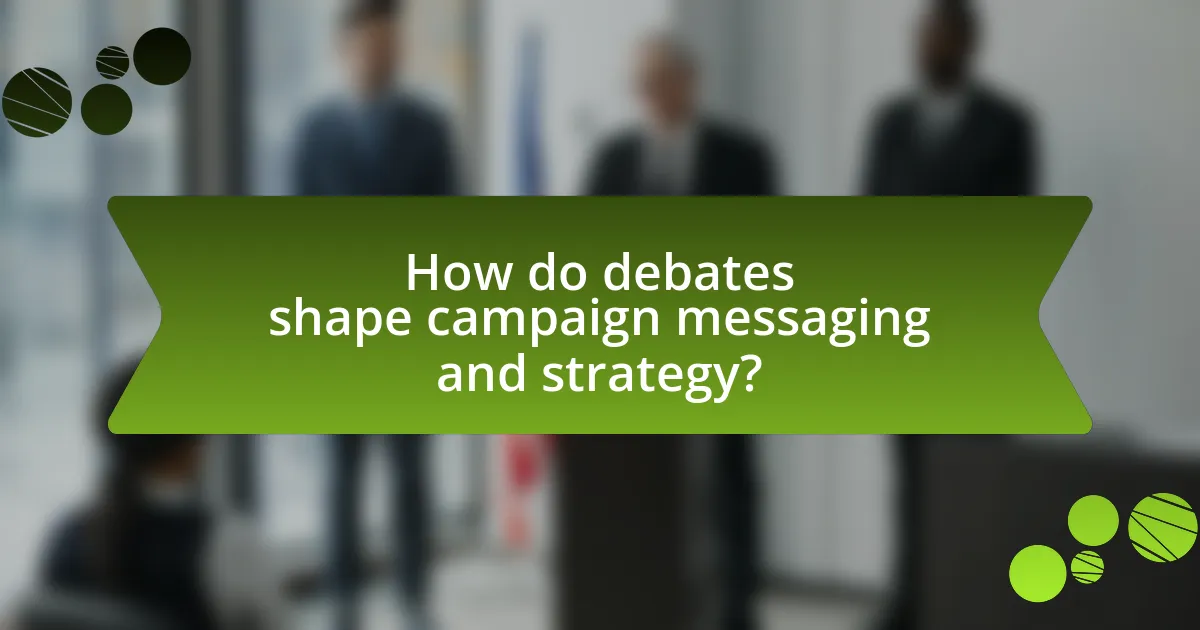
How do debates shape campaign messaging and strategy?
Debates shape campaign messaging and strategy by providing candidates with a platform to articulate their positions and respond to opponents in real-time. This interaction allows campaigns to refine their messaging based on audience reactions and media coverage, which can significantly influence voter perceptions. For instance, the 2016 U.S. presidential debates highlighted key issues such as immigration and healthcare, prompting candidates to adjust their strategies and focus on specific talking points that resonated with voters. Additionally, debates often serve as a litmus test for candidates, revealing strengths and weaknesses that campaigns can leverage or address in subsequent messaging efforts.
What messaging strategies are commonly employed in debates?
Messaging strategies commonly employed in debates include framing, emotional appeals, and rebuttals. Framing involves presenting issues in a way that highlights specific aspects to influence audience perception; for example, a candidate may frame economic policies as beneficial for the middle class to garner support. Emotional appeals target the audience’s feelings, often using personal stories or anecdotes to create a connection; studies show that emotional narratives can significantly impact voter decision-making. Rebuttals are used to counter opponents’ arguments, demonstrating a candidate’s ability to think critically and defend their position; effective rebuttals can sway undecided voters by showcasing a candidate’s competence and preparedness.
How do candidates adapt their messages based on debate performances?
Candidates adapt their messages based on debate performances by analyzing audience reactions and feedback to refine their communication strategies. For instance, after a debate, candidates often assess which points resonated with viewers and which did not, allowing them to emphasize successful arguments in future speeches and advertisements. This approach is supported by studies showing that candidates who effectively respond to debate dynamics can improve their polling numbers; for example, a post-debate analysis by the Pew Research Center indicated that candidates who pivoted their messaging based on debate performance saw a measurable increase in voter support.
What role does audience feedback play in shaping post-debate messaging?
Audience feedback plays a crucial role in shaping post-debate messaging by providing insights into public perception and priorities. This feedback allows campaign teams to adjust their messaging strategies to align with audience concerns and reactions observed during the debate. For instance, a study by the Pew Research Center found that candidates who effectively respond to audience feedback can enhance their relatability and voter engagement, leading to improved polling outcomes. By analyzing audience reactions, campaigns can identify key issues that resonate with voters, enabling them to tailor their communication to address those specific topics more effectively.
How do debates influence campaign resource allocation?
Debates significantly influence campaign resource allocation by directing funds and efforts toward areas that require improvement based on candidate performance. For instance, after a debate, candidates often reassess their strategies, reallocating resources to bolster weak points highlighted during the event. Research indicates that candidates who perform poorly in debates may increase spending on advertising and outreach in targeted demographics to recover lost ground, as seen in the 2012 U.S. presidential election where candidates adjusted their campaign strategies based on debate outcomes. This strategic reallocation is essential for maximizing voter engagement and addressing perceived weaknesses, ultimately shaping the overall campaign approach.
What factors determine the investment in debate preparation and advertising?
Investment in debate preparation and advertising is primarily determined by the perceived importance of the debate in influencing voter opinion, the competitive landscape of the election, and the available budget for campaign activities. The significance of debates in shaping campaign strategies is underscored by studies indicating that candidates who perform well in debates can experience a measurable increase in polling numbers, as seen in the 2016 U.S. presidential election where debate performances significantly impacted voter perceptions. Additionally, the allocation of resources is influenced by the need to counteract opponents’ strengths and capitalize on weaknesses, which requires strategic planning and financial investment in both preparation and advertising to effectively communicate messages to the electorate.
How do candidates prioritize issues based on debate discussions?
Candidates prioritize issues based on debate discussions by assessing audience reactions and media coverage to identify which topics resonate most with voters. During debates, candidates observe how their opponents address key issues and gauge public sentiment through polls and social media engagement. For instance, a candidate may shift focus to healthcare or economic policies if those topics generate significant viewer interest and discussion, as evidenced by post-debate analysis showing spikes in voter concern for those issues. This strategic adjustment allows candidates to align their campaign messages with the priorities of their constituents, ultimately enhancing their appeal in the electoral process.
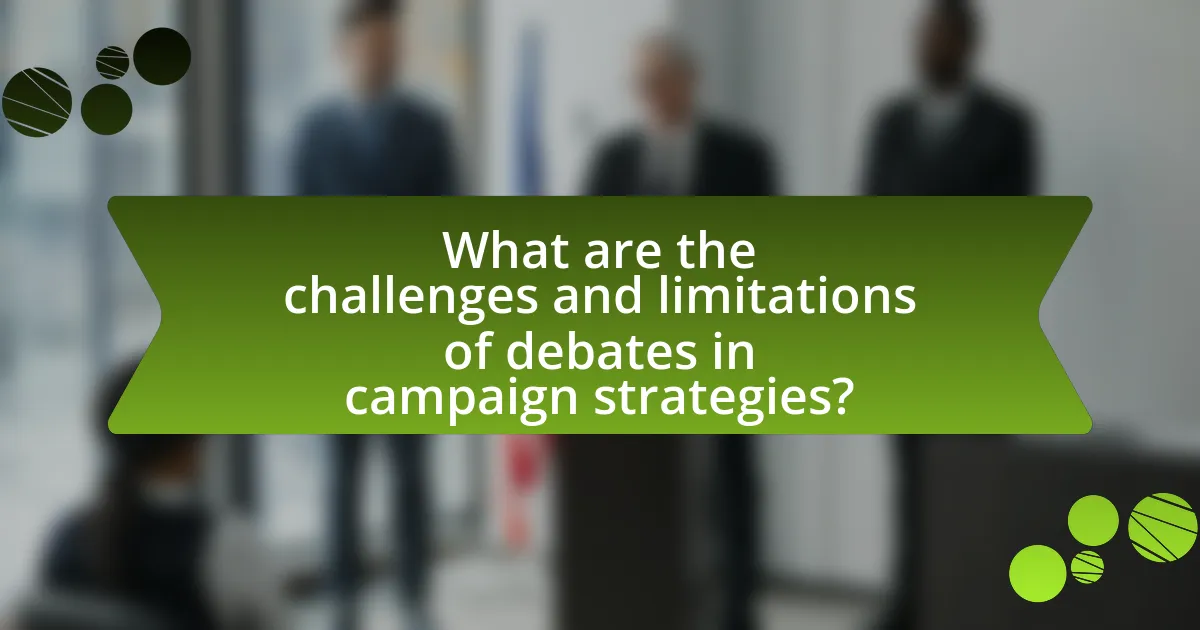
What are the challenges and limitations of debates in campaign strategies?
Debates in campaign strategies face several challenges and limitations, including time constraints, potential for miscommunication, and the influence of media framing. Time constraints often limit candidates’ ability to fully articulate their positions, leading to oversimplification of complex issues. Miscommunication can arise from the fast-paced nature of debates, where candidates may not effectively convey their intended messages, resulting in misunderstandings among voters. Additionally, media framing can skew public perception, as journalists may focus on soundbites rather than substantive policy discussions, impacting how candidates are viewed. These factors collectively hinder the effectiveness of debates as a tool for informing voters and shaping campaign narratives.
What criticisms exist regarding the format and fairness of debates?
Criticisms regarding the format and fairness of debates include concerns about time allocation, question selection, and moderator bias. Time allocation often favors candidates with more speaking time, which can skew perceptions of their competence. For instance, studies have shown that candidates who speak more frequently are perceived as more knowledgeable, regardless of the content of their statements. Question selection can also be biased, as moderators may inadvertently favor certain candidates by asking them more relevant or easier questions, impacting the overall fairness of the debate. Additionally, moderators may exhibit bias in their tone or follow-up questions, which can influence audience perception. These factors collectively raise questions about the equitable representation of candidates and the integrity of the debate process.
How do debate moderators impact the flow and fairness of discussions?
Debate moderators significantly influence the flow and fairness of discussions by controlling the structure and timing of exchanges. They establish rules that dictate how long each participant can speak, which helps maintain order and prevents one candidate from dominating the conversation. For instance, during the 2020 U.S. presidential debates, moderators enforced time limits that ensured both candidates had equal opportunities to present their views, thereby promoting fairness. Additionally, moderators can intervene to redirect discussions when they veer off-topic, ensuring that the debate remains focused on relevant issues. This structured approach not only enhances the clarity of the dialogue but also fosters a more equitable environment for all participants, ultimately shaping the audience’s perception of the candidates’ capabilities.
What are the limitations of debates in conveying complex policy issues?
Debates have significant limitations in conveying complex policy issues due to their time constraints and the need for simplification. The format of debates often restricts candidates to brief responses, which can lead to oversimplification of nuanced topics. For instance, a study by the Pew Research Center found that voters often leave debates with a limited understanding of policy details, as candidates prioritize sound bites over comprehensive explanations. Additionally, the competitive nature of debates can foster an environment focused on winning rather than informing, further hindering the audience’s grasp of intricate policy matters.
How can candidates overcome challenges faced during debates?
Candidates can overcome challenges faced during debates by employing effective preparation strategies, such as thorough research on topics, practicing responses to potential questions, and engaging in mock debates. These methods enhance their confidence and ability to articulate their positions clearly. For instance, a study by the American Political Science Association found that candidates who participated in extensive debate preparation were more likely to perform better and connect with their audience, demonstrating the importance of preparation in overcoming debate challenges.
What strategies can candidates employ to handle unexpected situations in debates?
Candidates can employ several strategies to handle unexpected situations in debates, including staying calm, pivoting to key messages, and using humor appropriately. Staying calm allows candidates to think clearly and respond effectively, which is crucial when faced with surprises or challenging questions. Pivoting to key messages helps candidates redirect the conversation back to their main points, ensuring that they maintain control over the narrative. Additionally, using humor can diffuse tension and make the candidate appear relatable, provided it is done tactfully. These strategies are supported by debate performance studies, which indicate that candidates who maintain composure and effectively manage unexpected moments tend to resonate better with audiences and achieve favorable perceptions.
How can candidates effectively respond to attacks from opponents during debates?
Candidates can effectively respond to attacks from opponents during debates by maintaining composure, directly addressing the accusation, and pivoting to their key messages. Composure allows candidates to project confidence and credibility, which is crucial in high-pressure situations. Addressing the accusation head-on demonstrates transparency and accountability, while pivoting to key messages reinforces their campaign’s core values and policies. For instance, during the 2016 U.S. presidential debates, candidates who effectively redirected the conversation to their strengths, such as policy proposals or personal anecdotes, often regained control of the narrative and resonated better with the audience. This strategy not only counters the attack but also reinforces the candidate’s overall campaign strategy.
What best practices should candidates follow to leverage debates effectively?
Candidates should prepare thoroughly to leverage debates effectively. This includes researching key issues, understanding opponents’ positions, and formulating clear, concise responses. Effective candidates practice their delivery to ensure confidence and clarity, which can enhance their credibility with voters. Additionally, candidates should focus on engaging with the audience by addressing their concerns and demonstrating empathy, as studies show that emotional connection can significantly influence voter perception. Furthermore, candidates must remain composed under pressure, as maintaining poise can positively impact public perception and media coverage.
